Michael J. Kalberer, LMSW, writes on his decision to join a revolutionary new trial studying an experimental gene therapy for safety and effectiveness at reversing a form of inherited retinal disorder that causes blindness. The historic trial is being co-led by Mass Eye and Ear, a member of Mass General Brigham. Watch the video above or click here for more on Michael’s story and the trial.
This past September, I underwent a surgery that made me the second person in the world to receive an experimental CRISPR gene therapy directly put into the body. The therapy was designed to treat a specific type of inherited retinal disorder (IRD). This was not a decision I took lightly but with nothing to lose since I was going blind anyway, I did my research and decided to dive head first into this once-in-a-lifetime opportunity. Regardless of the outcome, my main hopes in signing up for this trial are to advance science and that my experiences can help other people who identify with my story.
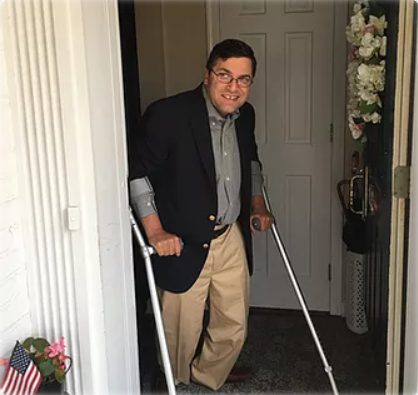
My life is a lot of fun and hard to encapsulate in a few sentences. I live on Long Island, New York, love listening to music, spending time with family and friends, and am a diehard sports fan — especially of my beloved Islanders. I am a social worker and professional public speaker. I was born with cerebral palsy and I have experienced vision problems throughout my life, but that is not what defines me. My parents raised me as a person with a disability and not a disabled person, and that’s something I’ve carried with me my whole life, and have tried to bring to others through my work. When people meet me for the first time, I don’t lead with I am blind, I lead with I am Michael.
I started recognizing difficulty with my vision around age 10, when there were problems with my depth perception. On some days, a curb would look like a driveway or vice versa, and I might trip and fall. In spite of this, I still played sports, saw a lot of friends and enjoyed school. I was always finding ways to compensate for my vision at an early age, such as by walking slower by curbs, or using a ruler when reading since my eyes might jump around. My CP was given as the explanation for the visual difficulties, and that was expected, since visual impairment is extremely common in our population. I had limited peripheral vision and when I played sports, I would have difficulty seeing when the sun was brighter. I would strangely see and play better when there were clouds.
I was eventually labeled legally blind at age 12 during a routine ophthalmology appointment, due to my symptoms. As I transitioned from middle to high school and eventually college, I was able to adapt to my low vision with audiobooks and given extra time for tests, and accommodations of a reader and a scribe. I finished my undergraduate education in Psychology and Speech Communication then followed that with a Master’s Degree in Social Work. I love being a social worker and helping others.
By the time I reached my early 30s in 2011, I experienced a precipitous drop in my vision. One time I was at an Islanders game and it looked like the scoreboard was underwater. My ophthalmologist saw that my eyesight was declining and referred me to a retina specialist by that April. The first thing the specialist said to me was, “Has anyone ever diagnosed you with a retinal degenerative disease?” I said “No, but something tells me you are going to.”
I was told I would without question lose my sight due to this progressive disorder. That was all anyone knew at the time. During this period, I was counselling people transitioning to blindness and losing their jobs, and helping them find services that could benefit them. That was one of the most challenging and rewarding experiences of my life. I would often find others I identified so much with; it sometimes felt like I was counseling myself.
As my vision loss progressed, a career counselor told me I was “unemployable.” How my vision loss has affected my career has been the biggest challenge for me in all of this, and one of the things I’m most hoping this surgery changes. Despite the hardships associated with employment, I have not been deterred. Soon after my diagnosis I started tutoring, and then a professor asked me to speak to a class of students training to be special education teachers about my experiences and how to apply practical skills of working with people with disabilities to their careers. This led to more lectures, and eventually, a career in public speaking. I formed my own company, Michael J. Kalberer Presents, where I use my experience to educate and prepare professionals to work with people with disability and blindness, and just as importantly, treat them with dignity they deserve.
My public speaking is what led me to learning about this trial. I gave a speech in 2015 at a luncheon for Foundation Fighting Blindness where I was on a panel with an expert who explained advances in genetic testing for IRDs, and the symptoms of certain forms of the disease, such as Leber congenital amaurosis (LCA). I thought I had at least seven of the LCA symptoms he mentioned in his presentation. The doctor was buttering a bagel during the lunch break and I tapped him on the shoulder and introduced myself and explained my realization. He immediately reached into his pocket and pulled out his phone, and arranged for genetic testing. The tests confirmed my suspicions that I had LCA.
Then during a 2019 gala for the same organization where I was giving a speech, I was told a clinical trial may be coming in the next year. That study was eventually called the BRILLIANCE trial, and was led by Dr. Eric Pierce at Mass Eye and Ear.
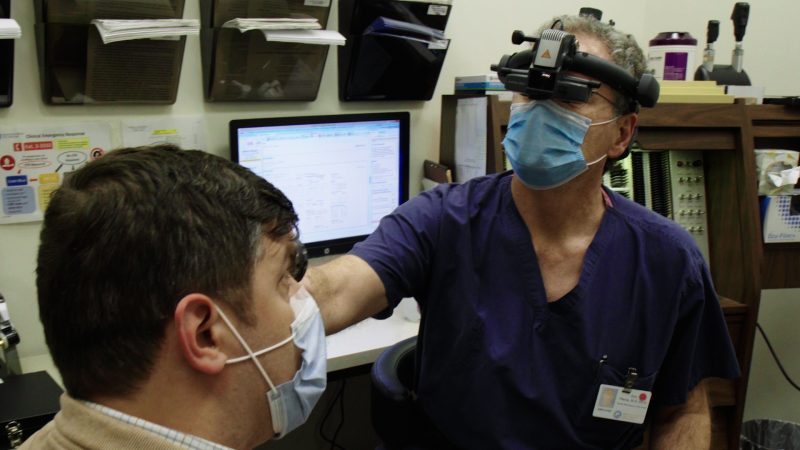
The research team there arranged for several days of screening, and made the process feel extremely smooth. They informed me as much as possible before I arrived about the trial and criteria, and answered all of my questions about the therapy. I learned that CRISPR gene therapy introduced a way to turn on an inactive gene I already had, rather than introducing new genes into my body, which was important to me for ethical reasons. They alleviated my family’s concerns too. They didn’t just talk about the science, they addressed me and my family as an entire unit. My family without question is just as invested in this as I am, if not more. I still didn’t know if I would get into the trial but I felt very comfortable with this team. After several days of screening, I was thrilled to learn I was a candidate to enter this trial.
People often ask if I was nervous, knowing I would be one of the first people in the world to receive this therapy. I felt in great hands with everyone at Mass Eye and Ear, including Dr. Pierce and the surgeon, Jason Comander, MD, PhD. I felt calm the night before my surgery aside from some anticipatory nerves which are common before any big event — if there’s ever such a thing as feeling comfortably nervous, that’s what I was. I had full trust in Dr. Comander and was completely informed about the procedure and what to expect related to the recovery. When I woke up I was happy to hear the surgery was a success. I tempered my expectations and knew there would be months, even years, of testing that followed to see if the procedure was safe and effective.
I considered this surgery a tremendous gift and opportunity, and I also felt a great responsibility: if my experience showed the procedure was safe and effective, others after me might benefit and possibly regain their sight. This trial gave me an opportunity I have been looking for the past decade since my IRD diagnosis, to be a leader in the blind community and be part of something far greater than myself.
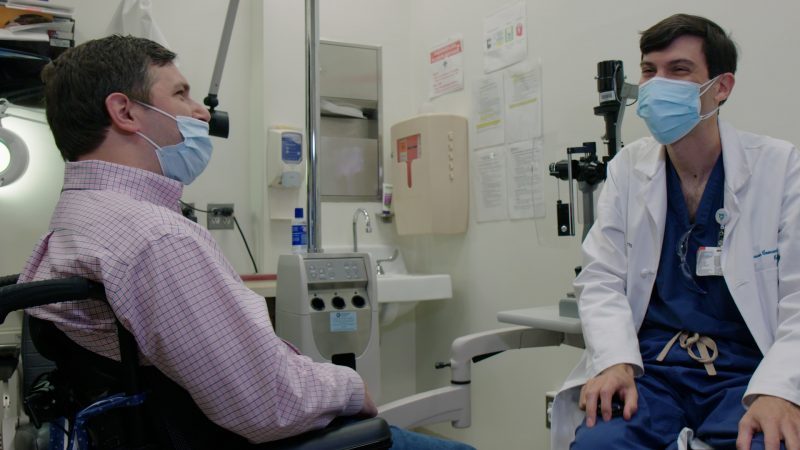
Since then, Mass Eye and Ear has exuded a spirit of collaboration when working with me throughout all my assessments and examinations, making sure they are adapted to me and my comfort without compromising the tests. It’s been an amazing partnership, and one of the things I’m most proud of in joining this trial.
Looking back now more than six months since I underwent the procedure, I would choose to do it again, 1,000 times out of 1,000. I’ve grown very close with the research team and the staff who do my testing and imaging; when I come to Boston for appointments, it feels like visiting family.
I’ve had a lot of time to reflect since my IRD diagnosis and the months since I entered the trial. The biggest advice I have for anyone who identifies with me, where they have a perceived limitation like a visual impairment, is that you should know you are not broken. Your vision may be limited, but you can always adapt. Be who you are. I turned what could have been my greatest deficit into what might be my greatest strength, my ability to communicate with many audiences in all environments, while still being me and loving life. Every day is a gift and I can’t wait to see what the future brings.
Michael J. Kalberer, LMSW, is a motivational speaker, cultural competence presenter and disability advocate based in Long Island, New York. For more information and to contact Michael, visit https://www.michaeljkalbererpresents.com/.
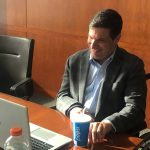

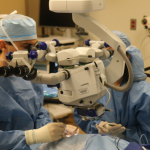
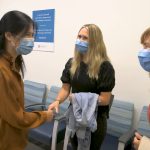
I wold like be in you study
I get e-mail from Eye&Ear hospital in Boston that they have trial on gen therapy for Vision loss.Please send me information where to call and sign up for this trial.
It is very inspirational to read stories such as this, as I have pars planitis in my lest eye and I have been suffering with this since the age of 15!
Thanks for reading and your thoughtful comment, Melodee. Michael is so inspiring to all of us here at Mass Eye and Ear!
Hello, this is Miguel !! Gene therapy is being one of the most incredible advances to cure incurable diseases, but the ROAD will be long and difficult and I hope that the treatment for the PRPF31 gene arrives soon, please have news when the clinical trial for PRPF31 begins. Thank you very much and my admiration for MEH
Did Michael gain vision after the treatment?
Hi Chris, stay tuned to our Focus blog for updates!